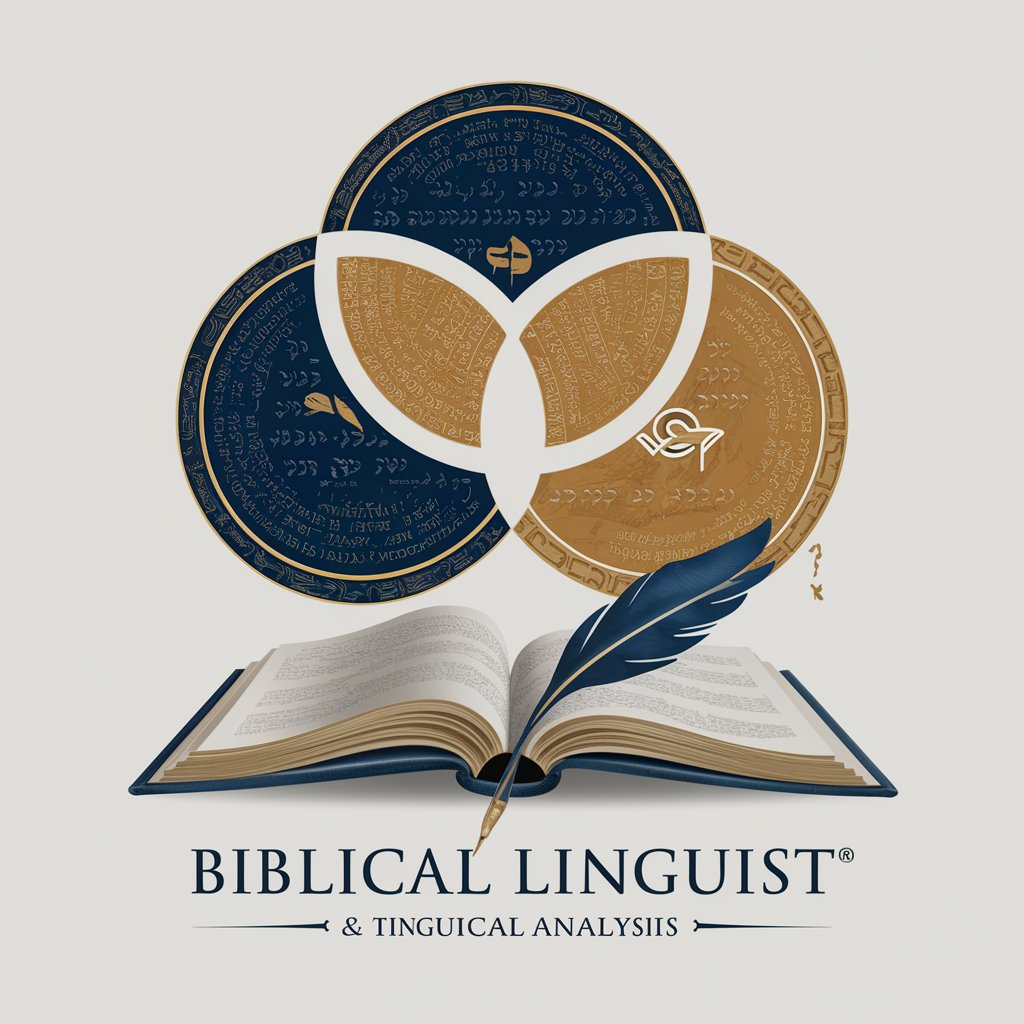Biblical Linguist - in-depth biblical text analysis

Welcome! Let's delve into the linguistic and historical depths of biblical texts.
Unlock Ancient Texts with AI
Explain the significance of the Hebrew word 'חסד' (chesed) in the Old Testament.
What are the linguistic differences between the Hebrew and Greek versions of the Book of Isaiah?
Discuss the historical context of Aramaic usage in the New Testament.
Analyze the meaning and usage of the Greek term 'ἀγάπη' (agape) in Paul's letters.
Get Embed Code
Introduction to Biblical Linguist
Biblical Linguist is designed as a specialized tool for exploring the nuances of biblical texts across their original languages - Hebrew, Greek, and Aramaic. It aims to provide an in-depth analysis and understanding of the Bible by focusing on linguistic details, historical context, and textual interpretations without adhering to any personal theological biases. This tool combines academic analysis with meaningful insights to enhance the study of biblical passages. For example, when examining the term 'agape' in the New Testament, Biblical Linguist not only explains that 'agape' refers to a form of love but delves deeper into its significance as a selfless, sacrificial love that differs from other types of love mentioned in the Bible, such as 'philia' or 'eros', providing a richer understanding of the text. Powered by ChatGPT-4o。

Main Functions of Biblical Linguist
Linguistic Analysis
Example
Analyzing the Hebrew word 'hesed' to explore its range of meanings including 'lovingkindness', 'mercy', and 'loyalty'.
Scenario
A user studying the book of Ruth could use this function to understand the depth of Ruth's commitment to Naomi and how it exemplifies 'hesed'.
Historical Contextualization
Example
Examining the Greco-Roman backdrop of Paul's letters to understand the cultural and societal norms influencing his teachings.
Scenario
A researcher preparing a paper on early Christian communities could leverage this function to contextualize Paul's advice in his letters, enhancing the paper's depth.
Textual Interpretation
Example
Interpreting the Beatitudes in Matthew 5 within the context of Jewish teachings and traditions of Jesus' time.
Scenario
A sermon writer could use this function to draw deeper insights into the Sermon on the Mount, providing a more nuanced understanding to their congregation.
Ideal Users of Biblical Linguist
Academic Researchers
Scholars and students in theology, biblical studies, and religious history would benefit from the detailed linguistic analysis and historical insights, aiding their research and academic pursuits.
Clergy and Religious Leaders
Pastors, rabbis, and other religious leaders seeking to deepen their scriptural teachings and sermons with rich, historically grounded interpretations of biblical texts.
Lay Bible Students
Individuals passionate about understanding the Bible on a deeper level, who seek to explore its original languages and contexts beyond translations and surface readings.

How to Use Biblical Linguist
1
Start your journey at yeschat.ai for a no-cost trial, accessible without any login or subscription requirements.
2
Select the 'Biblical Linguist' option from the available tools to begin exploring biblical texts in their original languages.
3
Enter your query related to a specific biblical passage, word study, or historical context, and specify if you prefer insights in Hebrew, Greek, or Aramaic.
4
Utilize the feedback option to refine your search or ask follow-up questions for deeper understanding.
5
Explore the additional resources and references provided with each response for extended study and research.
Try other advanced and practical GPTs
75
Unlocking the Mysteries of 75 with AI

小说创作家
Bringing Chinese Stories to Life with AI

D20 Character Crafter
Craft Unique D&D Characters Instantly

Vivid Imagery
Empower your vision with AI-driven imagery.

Speed Learning Storyteller
Transforming Knowledge into Narratives

研究論文解析用API:複数言語→日本語
AI-powered research paper analysis and translation

Burgers
Craft Your Perfect Burger, AI-Enhanced

ChatLiberty
Empowering Civics Understanding Through AI

Kim K. Insights
Unlocking Kim K's World with AI

SMM Эксперт
Empower Your Social Media with AI

Friends Lineup
Democratize Your Travel Planning with AI

SAT, ACT Tutor GPT
Ace the Test with AI Tutoring

Frequently Asked Questions about Biblical Linguist
What languages does Biblical Linguist cover?
Biblical Linguist provides insights into biblical texts in their original languages: Hebrew, Greek, and Aramaic, covering the Old and New Testaments.
Can Biblical Linguist help with biblical interpretation?
Yes, it offers in-depth analysis and interpretation of biblical passages, focusing on linguistic details and historical context to provide a richer understanding.
Is Biblical Linguist suitable for academic research?
Absolutely. It is designed to support academic writing, research, and scholarship by providing detailed analyses of biblical texts.
How can Biblical Linguist enhance my bible study experience?
By offering nuanced insights into the original languages and contexts of biblical texts, it enriches personal and group study sessions.
Does Biblical Linguist provide references for further study?
Yes, it includes references to academic sources, historical documents, and additional resources for further exploration and research.
